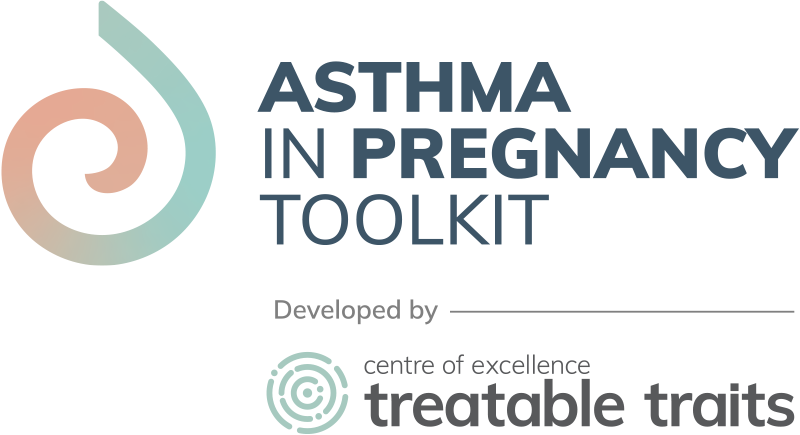Viral Infections

Viral infections play a significant role in asthma exacerbations during pregnancy. Pregnant women with asthma have more common colds than those without asthma, particularly in the second trimester, and during winter and spring. This may explain the increased exacerbation risk during the second trimester of pregnancy. Susceptibility to infection may be increased because of a pregnancy-related impairment in antiviral interferon responses, deficiencies in epithelial cell function, overproduction of mucus, or alveolar macrophage dysfunction (Murphy et al. 2013, Forbes et al. 2012 a, 2012 b, James et al. 2012)
Common respiratory viral infections include:
- Human Rhinovirus
- Human Metapneumovirus
- Coronavirus – for more information on the novel coronavirus and COVID-19 visit this page.
- Enterovirus
- Influenza A and Influenza B
- Respiratory syncytial virus (more rarely)
Women with asthma are more likely to suffer poor outcomes following viral infections, including:
- Increased asthma exacerbations that require medical intervention
- Loss of asthma control
- Lower birthweight babies
- Higher likelihood of pre-eclampsia (Murphy et al. 2013)
An American study showed that pregnant women with asthma were significantly more likely to be hospitalised with a diagnosis of influenza or other acute respiratory conditions during the influenza season than women without asthma (OR 10.63, 95 % CI 8.18 – 13.83) (Hartert et al. 2003). Others have shown that prevention of infections by vaccination was associated with an improvement of asthma symptoms during pregnancy (Ali and Ulrik 2013, Kwon et al. 2003, Rastogi et al. 2006).
Bacterial infections and antibiotic use

Little data available is available on the incidence of bacterial respiratory infections during pregnancy for women with asthma.
Pregnant women should only be given antibiotics in pregnancy when an infection has been diagnosed, and not for a cough or cold. Untreated infections in pregnancy can be very serious and lead to adverse health outcomes for both mother and baby. It is important for women take antibiotics if they have a bacterial infection during pregnancy, despite reported possible risks for later infection, eczema or food allergies in their child, as the benefit of receiving treatment far outweighs these risks.
Antibiotic use during pregnancy has also been associated with an increased risk of asthma in children (Gao et al. 2021). However, large, register-based studies suggest this association may fact be due to an inherited susceptibility to infection. These studies evaluated associations with antibiotic exposure to the mother during, and around the pregnancy period, which showed the mother’s use of antibiotics outside the pregnancy period was just as important a risk factor for asthma in the child. A higher risk of disease was also found in siblings unexposed to maternal antibiotics during pregnancy (Ortqvist et al. 2014, Stokholm et al. 2014, Slob et al. 2020)
Recommendations for protection of pregnant women against viral and bacterial illness
- Pregnant women should be given seasonal influenza vaccine at any time during influenza season, if not already received.
- Vaccination against COVID-19 is recommended for all pregnant women.
- Pertussis-containing vaccine can be given early in the 3rd trimester (ideally 20–32 weeks).
- Pregnant women should only be given antibiotics in pregnancy when an infection has been diagnosed. Untreated infections in pregnancy can be very serious for both mother and baby.
For more information, including pre-pregnancy vaccination advice, visit:
